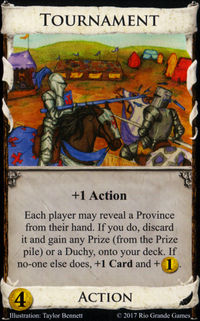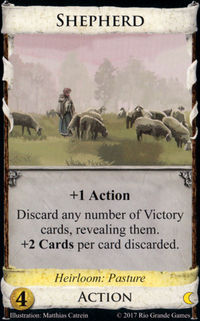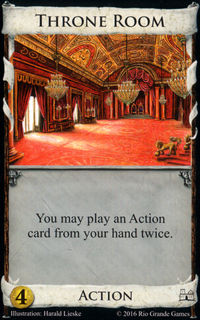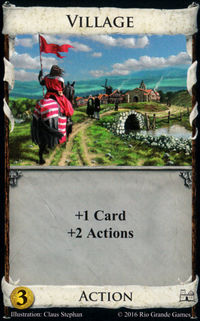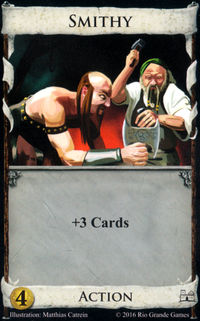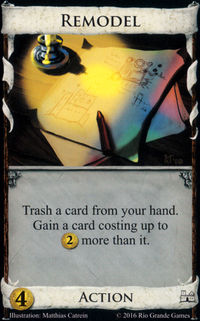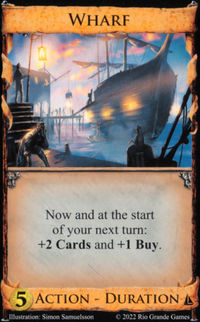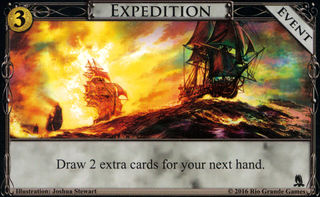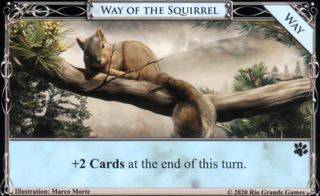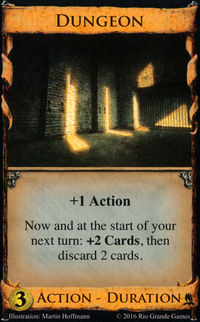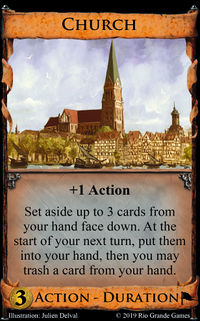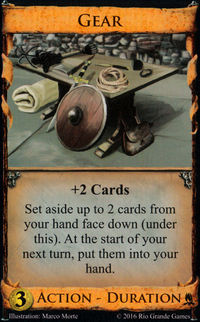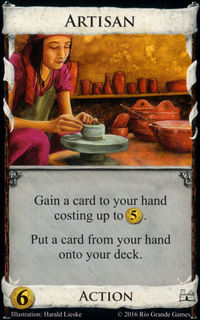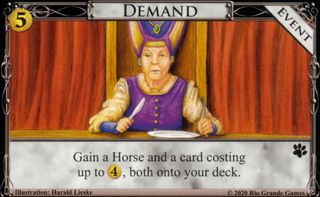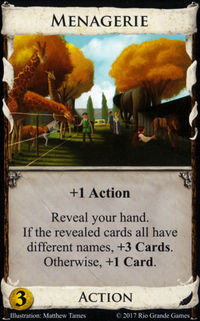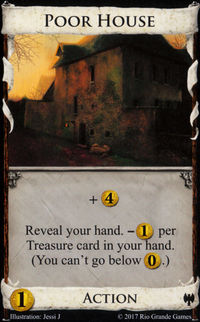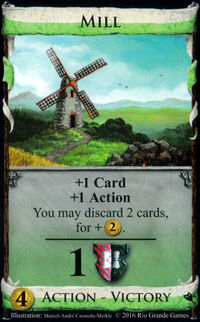Collision
Terracubist (Talk | contribs) m (Protected "Collision": this page has been edited to the satisfaction of the dominion discord. please come engage with us before editing this page! https://discord.gg/fhCKbTcJyW ([edit=autoconfirmed] (indefinite) [move=autoconfirmed] (indefinite)) |
|||
| (16 intermediate revisions by 9 users not shown) | |||
| Line 1: | Line 1: | ||
| − | A | + | A '''collision''' refers to having two or more given cards together in the same hand. |
| − | + | A '''terminal collision''' occurs when you draw two or more [[terminal]] [[Action card|Action cards]] into your hand without enough actions to play them both. One of the two Action cards is essentially a [[dead|dead card]], reducing your effective hand size. This is particularly bad when two powerful cards are drawn together, as one of the cards will have to wait for another reshuffle before it can be used. | |
| − | {{ | + | == Strategy == |
| + | To “collide” two cards is to have them in your hand at the same time. Depending on the nature of the cards in question, this may enable some beneficial interaction, or completely stymie your ability to use them. You should seek out ways to set up certain collisions, while aiming to avoid others. | ||
| + | |||
| + | ===Good collisions=== | ||
| + | Several cards have effects that activate only if you can collide them with another card or type of card. For example, {{Card|Province}} activates {{Card|Tournament}}; {{Card|Shepherd}} is useless in a hand without [[Victory]] cards; and {{Card|Throne Room}} needs to collide with another [[Action]] card. Other cards simply synergize with each other and can be put to more effective use if they appear together in your hand, e.g. {{Card|Village}} and {{Card|Smithy}}, or {{Card|Remodel}} with {{Card|Gold}}. | ||
| + | |||
| + | Drawing your entire deck is the most effective and reliable way to collide any cards you want. If you have [[overdraw]], you can even [[gain-and-play|gain cards and then draw them immediately]] in order to collide them with other cards in your hand. However, in many cases, your ability to draw your deck is dependent on certain cards colliding in your starting hand, such as {{Card|Village}} with {{Card|Smithy}}. Therefore, increasing your starting hand size (using [[Duration]] draw cards like {{Card|Wharf}}, or other effects such as {{Event|Expedition}} or {{Way|Way of the Squirrel}}) can be an especially powerful way to ensure you collide the cards you need to. [[Sifter|Sifting]] cards, especially those such as {{Card|Dungeon}} that activate at the start of your turn, can also help you collide the cards that you want to see together, even though they don’t increase your hand size. | ||
| + | |||
| + | Some effects can ‘seed’ your next hand to guarantee that certain cards will collide in it. {{Card|Church}} and {{Card|Gear}} do this by carrying cards over directly from your previous hand; other effects, e.g. {{Card|Artisan}} or {{Event|Demand}}, can do so by top-decking the desired cards. An indirect way of seeding your next turn is to put the cards you want to collide into your discard pile (assuming it’s empty) and trigger a [[shuffle]] at the end of your turn—as an example, {{Card|Shepherd}} commonly encourages such triggers. | ||
| + | |||
| + | ===Bad collisions=== | ||
| + | The most common example of a collision you would rather avoid is [[terminal]] collision, in which multiple terminal Actions appear in your hand without enough +Actions to enable you to play them all. Some cards anti-synergize with other cards in your hand in different ways: for example, {{Card|Menagerie}} only activates if no cards in your hand have collided with copies of themselves, while {{Card|Poor House}} won’t generate any {{Cost}} if it collides with too many [[Treasure]]s. | ||
| + | |||
| + | In order to avoid terminal collision in a deck-drawing engine, you should make sure you have enough [[terminal space]]. Extra terminal space may be desirable to gain and play additional terminals during your turn. In a deck that does not draw itself, for example a [[Big Money|money]] strategy, you may consider adding more terminal Actions than your total terminal space would typically dictate. | ||
| + | |||
| + | Similar techniques to those that promote helpful collisions, including careful management of shuffle timing, play order, and the balance of your deck’s contents, can help you minimize the risk of harmful collisions. The discarding component of sifters and cards such as {{Card|Mill}} can also be particularly helpful here. | ||
{{Navbox Strategy}} | {{Navbox Strategy}} | ||
| + | [[Category:Strategic concepts]] | ||
Latest revision as of 15:27, 18 April 2021
A collision refers to having two or more given cards together in the same hand.
A terminal collision occurs when you draw two or more terminal Action cards into your hand without enough actions to play them both. One of the two Action cards is essentially a dead card, reducing your effective hand size. This is particularly bad when two powerful cards are drawn together, as one of the cards will have to wait for another reshuffle before it can be used.
[edit] Strategy
To “collide” two cards is to have them in your hand at the same time. Depending on the nature of the cards in question, this may enable some beneficial interaction, or completely stymie your ability to use them. You should seek out ways to set up certain collisions, while aiming to avoid others.
[edit] Good collisions
Several cards have effects that activate only if you can collide them with another card or type of card. For example, Province activates Tournament; Shepherd is useless in a hand without Victory cards; and Throne Room needs to collide with another Action card. Other cards simply synergize with each other and can be put to more effective use if they appear together in your hand, e.g. Village and Smithy, or Remodel with Gold.
Drawing your entire deck is the most effective and reliable way to collide any cards you want. If you have overdraw, you can even gain cards and then draw them immediately in order to collide them with other cards in your hand. However, in many cases, your ability to draw your deck is dependent on certain cards colliding in your starting hand, such as Village with Smithy. Therefore, increasing your starting hand size (using Duration draw cards like Wharf, or other effects such as Expedition or Way of the Squirrel) can be an especially powerful way to ensure you collide the cards you need to. Sifting cards, especially those such as Dungeon that activate at the start of your turn, can also help you collide the cards that you want to see together, even though they don’t increase your hand size.
Some effects can ‘seed’ your next hand to guarantee that certain cards will collide in it. Church and Gear do this by carrying cards over directly from your previous hand; other effects, e.g. Artisan or Demand, can do so by top-decking the desired cards. An indirect way of seeding your next turn is to put the cards you want to collide into your discard pile (assuming it’s empty) and trigger a shuffle at the end of your turn—as an example, Shepherd commonly encourages such triggers.
[edit] Bad collisions
The most common example of a collision you would rather avoid is terminal collision, in which multiple terminal Actions appear in your hand without enough +Actions to enable you to play them all. Some cards anti-synergize with other cards in your hand in different ways: for example, Menagerie only activates if no cards in your hand have collided with copies of themselves, while Poor House won’t generate any if it collides with too many Treasures.
In order to avoid terminal collision in a deck-drawing engine, you should make sure you have enough terminal space. Extra terminal space may be desirable to gain and play additional terminals during your turn. In a deck that does not draw itself, for example a money strategy, you may consider adding more terminal Actions than your total terminal space would typically dictate.
Similar techniques to those that promote helpful collisions, including careful management of shuffle timing, play order, and the balance of your deck’s contents, can help you minimize the risk of harmful collisions. The discarding component of sifters and cards such as Mill can also be particularly helpful here.

